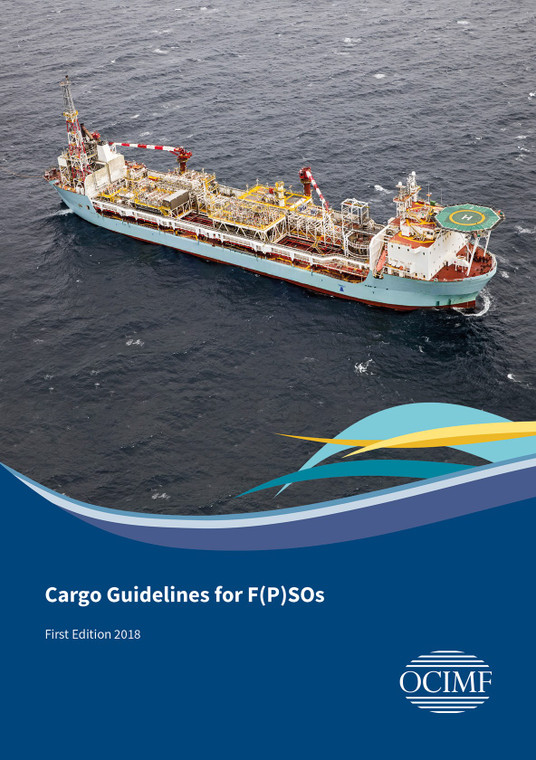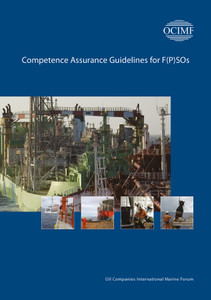
This publication provides recommendations and best practice guidelines for the safety of cargo handling and associated operations on board F(P)SO facilities.
This publication is a guide to safe cargo handling and associated operations on board F(P)SOs. It supplements existing guidance in the International Safety Guide for Oil Tankers and Terminals (ISGOTT), by addressing activities and procedures that are either outside the scope of ISGOTT or are conducted differently on F(P)SOs, which often have multiple operations taking place at the same time.
Purpose and scope
This publication makes recommendations on the safety of cargo handling and associated operations on board Floating (Production) Storage and Offloading facilities (F(P)SOs). It supplements guidance in OCIMF’s International Safety Guide for Oil Tankers and Terminals (ISGOTT) by addressing activities and procedures that are either outside the scope of ISGOTT or are conducted differently on F(P)SOs. The guidance is for F(P)SO operators but will also be of interest to anyone involved in the design and management of F(P)SOs.
Fundamental differences exist between the operation of an F(P)SO and a tanker. An F(P)SO may remain on station for several years and may be required to concurrently undertake oil and gas processing, loading, water management, discharging and in-tank maintenance activities. Existing industry guidance for conventional tankers, e.g. ISGOTT, is not always suitable for F(P)SOs because it does not address the safe management of these concurrent activities. The purpose of this publication is to provide guidance, recommendations and best practice on management. Full attention is given to the need for robust planning and work scope development, supported by appropriate risk analysis and Permit to Work (PTW) systems.
This publication also takes into account the operational issues associated with the potential presence of contaminants in oil and gas streams, which may include, for example, mercury and hydrogen sulphide (H2S). Sediments in storage tanks may include harmful substances such as oilfield scales and Naturally Occurring Radioactive Materials (NORMs), which can pose potential health risks to personnel.
Many storage tank maintenance activities on an F(P)SO have to be undertaken while the unit is on station and handling oil and gas production streams. This publication provides recommendations on the safe isolation of tanks from the active systems and procedures for safe tank entry. Specific guidance is provided for hot and cold work in tanks, tank inspections and safe practices for the routine removal of sediments from cargo spaces.
Where differences exist between the recommendations in this publication for activities undertaken on F(P)SOs, and those in ISGOTT for oil tankers, the procedures detailed in this publication should be followed by F(P)SO personnel, with the aim of achieving equivalent or higher levels of safety.
Although the recommendations in this publication primarily relate to F(P)SOs that have a conventional hull form, much of the guidance can be equally applicable to other designs, e.g. those based on a cylindrical hull, as there are no fundamental differences in cargo management procedures. Operators of such units are encouraged to review the relevance of the guidance on a case-by-case basis.
Routine cargo transfer operations to offtake tankers are outside the scope of this publication and are addressed in OCIMF’s Guidelines for Offshore Tanker Operations.
It is recommended that personnel competence assessment activities follow the guidance in OCIMF’s Competence Assurance Guidelines for F(P)SOs.
Always refer to the current edition of any publication referenced in this book.
Purpose and scope
Glossary
Abbreviations
Bibliography
Section one – Safety management
Section two – Hazardous materials associated with F(P)SO operation
Section three – General hazards associated with F(P)SO operations
Section four – Storage tank atmosphere control and venting arrangements
Section five – F(P)SO cargo operations
Section six – Water management
Section seven – Crude Oil Washing
Section eight – Tank cleaning and gas freeing for entry
Section nine – Control of work in storage and ballast tanks
Appendix – Example of a SIMOPS decision making matrix
The Oil Companies International Marine Forum (OCIMF) is a voluntary association of oil companies with an interest in the shipment and terminalling of crude oil, oil products, petrochemicals and gas. OCIMF focuses exclusively on preventing harm to people and the environment by promoting best practice in the design, construction and operation of tankers, barges and offshore vessels and their interfaces with terminals. Learn more at www.ocimf.org
- Number of Pages:
- 140
- ISBN:
- 9781856097642
- Published Date:
- July 2018
- Binding Format:
- Hardback
- Book Height:
- 305 mm
- Book Width:
- 215 mm
- Weight:
- 1.1 kg
- Author:
OCIMF
- Preview:
- Yes





